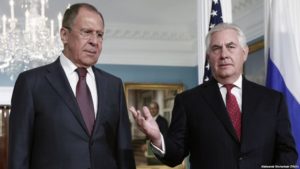Special to WorldTribune.com
Radio Free Europe / Radio Liberty
WASHINGTON — Russia’s foreign minister has held talks with U.S. Secretary of State Rex Tillerson, discussing Syria, Ukraine, and other issues.
Sergei Lavrov’s May 10 discussions with his American counterpart came just hours before the top Russian diplomat’s scheduled meeting with U.S. President Donald Trump.

Tillerson said the meeting was a chance for the two to “continue our dialogue and our exchange of views” since his trip to Moscow last month. At the time, Tillerson said relations with Russia needed to be rebuilt.
Lavrov’s meeting with Trump, meanwhile, will be the highest-level meeting the U.S. president has had with Russian officials since taking office in January.
The meeting also comes one day after Trump fired FBI Director James Comey, who was overseeing the criminal investigations into the ties between Trump associates and Russian officials.
Asked by reporters about the Comey firing, Lavrov reacted sarcastically, saying, “Was he fired? You’re kidding. You’re kidding.” Then he waved his hand dismissively and exited the room alongside Tillerson.
During last year’s election campaign, Trump called for better relations with Russia. Since taking office, however, many top cabinet officials have voiced a tougher stance that is closer to more conventional Republican approaches and to the policies of former President Barack Obama.
The administration has backed NATO efforts to counter Russia’s military buildup and aggressive actions in Europe, from the Baltics to Ukraine and Georgia.
Despite differences over Syria, it is one area where Russia and Washington are trying to find common ground to jointly battle Islamic State militants and end the six-year war there.
Last week, Russia, Iran, and Turkey agreed to the establishment of “de-escalation zones” in Syria, where Russia has given President Bashar al-Assad’s government crucial military and diplomatic backing throughout the war.
The State Department has stressed that the United States is not a party to the agreement and has several concerns about it, but that Washington hopes it “can contribute to a de-escalation of violence, end the suffering of the Syrian people, and set the stage for a political settlement of the conflict.”
U.S. Defense Secretary Jim Mattis said on May 8 that the United States would examine the plan “very, very carefully.”
Relations with Moscow were badly strained by Russia’s 2014 annexation of Ukraine’s Crimean Peninsula and its backing of separatists in eastern Ukraine, helping spark a war that has killed more than 9,900 people.
The United States imposed sanctions on Russia over its interference in Ukraine, and Trump administration officials including Tillerson have indicated they will remain in place until Moscow fulfills certain conditions.
Ties between Washington and Moscow have been frayed further by allegations that Russia sought to sway the U.S. presidential election in Trump’s favor last year.
In January, the U.S. intelligence community issued an assessment charging that Russian President Vladimir Putin ordered an “influence campaign” seeking to undermine faith in the U.S. electoral system and denigrate Democratic candidate Hillary Clinton. It said that Russia developed a clear preference for Trump.
In addition to the FBI probes, at least three congressional panels are also looking into Russia’s alleged meddling in U.S. politics.
Following the Washington meetings, Lavrov and Tillerson were both expected to attend a meeting of foreign ministers of countries in the Arctic Council in Alaska on May 11.
